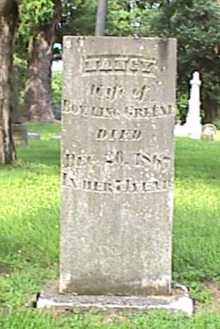Home | News | Books | Speeches | Places | Resources | Education | Timelines | Index | Search
Grave of Nancy Green, a Lincoln friend
© Abraham Lincoln OnlineAbraham Lincoln's Favorite Poem
In the 1830s, Dr. Jason Duncan introduced Lincoln to the poem "Mortality" (sometimes called "Immortality" or "Oh, Why Should the Spirit of Mortal be Proud?"). At the time, the increasingly melancholy Lincoln lived in New Salem, Illinois, and had already lost several friends and relatives to death.Gradually Lincoln memorized the piece, but did not know the author's identity until late in life. He became so identified with the poem that some people thought he had written it. However, he only wished he had. He once remarked, "I would give all I am worth, and go in debt, to be able to write so fine a piece as I think that is." The author, a descendant of reformer John Knox, published the poem in a collection called The Songs of Israel in 1824, shortly before his death at age 36.
Lawrence Weldon, who traveled the law circuit with Lincoln, recalled Lincoln reciting the poem in 1860. He said, "The weird and melancholy association of eloquence and poetry had a strong fascination for Mr. Lincoln's mind. Tasteful composition, either of prose or poetry, which faithfully contrasted the realities of eternity with the unstable and fickle fortunes of time, made a strong impression on his mind."
Mortality
By William KnoxOh! why should the spirit of mortal be proud?
Like a swift-fleeting meteor, a fast-flying cloud
A flash of the lightning, a break of the wave
He passeth from life to his rest in the grave.The leaves of the oak and the willow shall fade,
Be scattered around, and together be laid;
And the young and the old, and the low and the high,
Shall moulder to dust, and together shall lie.The infant a mother attended and loved;
The mother that infant's affection who proved;
The husband, that mother and infant who blest,--
Each, all, are away to their dwellings of rest.The maid on whose cheek, on whose brow, in whose eye,
Shone beauty and pleasure, -- her triumphs are by;
And the memory of those who loved her and praised,
Are alike from the minds of the living erased.The hand of the king that the sceptre hath borne,
The brow of the priest that the mitre hath worn,
The eye of the sage, and the heart of the brave,
Are hidden and lost in the depths of the grave.The peasant, whose lot was to sow and to reap,
The herdsman, who climbed with his goats up the steep,
The beggar, who wandered in search of his bread,
Have faded away like the grass that we tread.The saint, who enjoyed the communion of Heaven,
The sinner, who dared to remain unforgiven,
The wise and the foolish, the guilty and just,
Have quietly mingled their bones in the dust.So the multitude goes -- like the flower or the weed
That withers away to let others succeed;
So the multitude comes -- even those we behold,
To repeat every tale that has often been told.For we are the same our fathers have been;
We see the same sights our fathers have seen;
We drink the same stream, we view the same sun,
And run the same course our fathers have run.The thoughts we are thinking, our fathers would think;
From the death we are shrinking, our fathers would shrink;
To the life we are clinging, they also would cling; --
But it speeds from us all like a bird on the wing.They loved -- but the story we cannot unfold;
They scorned -- but the heart of the haughty is cold;
They grieved -- but no wail from their slumber will come;
They joyed -- but the tongue of their gladness is dumb.They died -- ay, they died; -- we things that are now,
That walk on the turf that lies over their brow,
And make in their dwellings a transient abode;
Meet the things that they met on their pilgrimage road.Yea! hope and despondency, pleasure and pain,
Are mingled together in sunshine and rain;
And the smile and the tear, the song and the dirge,
Still follow each other, like surge upon surge.'Tis the wink of an eye -- 'tis the draught of a breath--
From the blossom of health to the paleness of death,
From the gilded saloon to the bier and the shroud:--
Oh! why should the spirit of mortal be proud?Related Link
Poetry Written by Abraham Lincoln
Home | News | Education | Timelines | Places | Resources | Books | Speeches | Search Introduction copyright © 2015 Abraham Lincoln Online. All rights reserved. Privacy Policy

